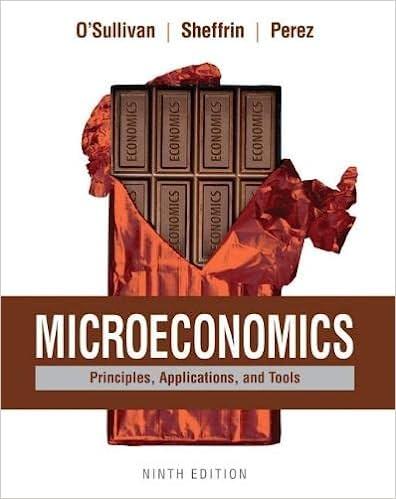Suppose the national government imposes a new tax of $3 per gallon of gasoline, which will bring
Question:
Suppose the national government imposes a new tax of $3 per gallon of gasoline, which will bring gasoline taxation in the United States closer to the levels experienced in European countries. And suppose the gasoline tax is combined with a cut in income taxes to ensure that total tax revenue doesn’t change. In other words, the gasoline tax is revenue neutral. How will such a tax policy affect total gasoline consumption?
It may be tempting to conclude that the change in tax policy will not change gasoline consumption. After all, the policy doesn’t change the tax liability of the typical taxpayer: the increase in gasoline taxes is offset by a decrease in income taxes. This was the logic of Ronald Reagan in his campaign for president against John Anderson, who proposed a revenueneutral increase in the gasoline tax. Reagan said that the idea was silly because it simply took money from one of the taxpayer’s pockets and put it back into the other pocket.
This logic is faulty because it ignores the substitution effect of a price change. For example, consider the typical taxpayer Mr. Evgeny Slutsky, who buys 300 gallons of gasoline per year.
He will pay $900 in gasoline taxes per year, while his income taxes will be cut by $900 per year. So Evgeny can still afford to do what he did before the change in taxes: his original bundle of gasoline and other goods is still affordable. Although Evgeny can still afford his original choice, that’s not the best choice. As we’ve seen in our discussion of the substitution effect, the gas tax decreases the marginal utility per dollar spent on gasoline, which is now less than the marginal utility per dollar spent on other goods. Gasoline now generates a lower marginal bang per buck, and the rational response for Evgeny is to buy less gasoline and more of the other goods, which now have a larger marginal bang per buck. This is the substitution effect in action, and we know for sure that a revenue-neutral increase in the gasoline tax will decrease gasoline consumption.

Question.
How would a simultaneous increase in the gasoline tax and a decrease in the income tax affect gasoline consumption?
Step by Step Answer:

Microeconomics Principles Applications And Tools
ISBN: 9780134078878
9th Edition
Authors: Arthur O'Sullivan, Steven Sheffrin, Stephen Perez





